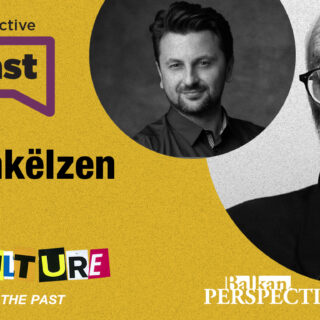Different media for conveying messages, such as television, theatre and music play an important role in raising pluralism and tolerance, while also overcoming stereotypes and ethnocentric narratives in popular culture. The artistic and cultural offer can create connections between people, expose prejudices from the past, founding values that are then transferred from the local communities to the national level, as a common principle.
The first example that comes to mind is the TV series ‘Nashe maalo [Our Neighbourhood]’, which was broadcast from 1999 to 2004. It will remain as one of the more successful projects, especially because it encouraged coexistence and inter-ethnic understanding through five seasons, with a total of 40 episodes that filled the everyday lives with the adventures of the big and small children – Beni, Ice, Ceylan, Zana, Mali and Darko and the rest of the characters, who taught people through the TV screens to value the qualities of diversity, not origin or religion.
“The idea was to do something for resolving conflicts between young people. We also had good guidance from the first co-producers of ‘Nashe maalo’, who are pioneers of the Children’s Television Workshop, the creators of ‘Sesame Street’. There was also a good seminar with creative people from all over Macedonia, including Goran Stefanovski, whose original idea was for the building ‘Karmen’ to speak. So, we launched a feature series for children with very good quality”, says producer Ivo Antov from the production of ‘Nashe maalo’.
They had a well worked out plan for the seasons. Some episodes focused on learning about the customs of different ethnic communities, others focused on basic human conflicts. For example, they adapted the story of the stolen necklace and the wrongly accused man by Guy de Maupassant, teaching children not to stigmatize their poorer peers as ‘thieves’ and so on.
“It was all for education and general understanding. We had a lot of fun, and I can see that the actors themselves influenced and entire generation and their surroundings. An entire generation grew up with the series and those people lived their formative years, however, in a more adequate way than those who are growing up in an era of hate and anti-hate, woke and anti-woke, cancel and anti-cancel, where polarities, rather than commonalities, are being highlighted”, emphasizes Antov.
According to Antov, the series ‘Nashe maalo’ was a picture and an opportunity for various neighbourhoods in Macedonia. Everyone had a neighbour or friend who was of “that” nationality.
“Skopje has always been a mixed, multicultural city. People from all nationalities lived here, they spoke different languages, they had different cultures, but celebrated all holidays together. We knew how to live like that, but with time we seem to have forgotten. The point of the medium nowadays would be to teach the consumers about what they have forgotten. That would be a message to all policy-makers, but also to those who implement them”, emphasized Antov.
Apart from television, theatre also plays an important role. The director Dragana Gunin, who, in addition to Macedonian, stages plays in Albanian and Turkish, believes that the theatre has a sensitive and thorough approach to every topic in general, and hence also to prejudice and stereotypes. When she is working on a play, she does not present the prejudices as such, but deconstructs them for herself and to herself.
“I see to what extent I have them in me, and I look at them and process them through a new idea. I don’t want to impose my whims and frustrations on the audience. Theatre can only ‘destroy’ something if the ones who work on it, ‘destroy’ the prejudice in themselves… or if I can’t, then at least I have to be honest and start with the idea that this is my position at the moment and see what I can do. But under no circumstances should I impose an opinion. It can be dangerous, because the stage is powerful”, says this theatre director.
In 2022, in an independent production, Gunin staged the play “Departures/Largime” in the Albanian Theatre in Skopje in Macedonian and in the Albanian language. Previously, in 2018, she directed “Anna and Hanna/Anna ve Hanna”, which was performed at the Turkish Theatre – Skopje in Turkish, and the plays “Therapy” and “Regional Network” premiered in Novi Sad and Zagreb, both in Serbian.
Regarding the turnout of the audience when they have to watch performances in a language they do not understand, Gunin believes that the situation has improved compared to the past. There is translation, she says, but the point of theatre is to communicate with the audience on a deeper level.
“The point of the one who runs the theatre is to make the play understandable even when the language is not understood by everyone. When I worked with young people, in my drama studio, we deliberately used words/expressions from other languages in the plays. When you’re an audience and not a theatre worker, it’s certainly not easy to watch a three-hour play in a language you don’t understand. That’s why the translation is crucial, although I haven’t had it in the last performances out of technical reasons. However, even though I am not in the section that keeps track of statistics, there are audiences at my plays even when the play is not in their mother tongue”, she notes.
One of the examples of how popular culture brings us together is through music. In Macedonia, such multilingual examples are set by, among others, the Albanian-Macedonian rock band from Skopje “Bla Bla Bla”, formed in 1988, the singer Arben Beni Shaqiri with his band, as well as the Tetovo group “Këpurdhat”.
The indie-rock group “Këpurdhat”, formed at the end of 2013, has performed in various environments, in numerous cities throughout Macedonia, but also in Serbia, Kosovo, Albania and Switzerland, and they say that they felt great everywhere.
“The audience always appreciates our music and the atmosphere we share. It’s not about the language you speak, it’s about the energy and positivity you give off. We can honestly say that there was no lack of respect for an ethnically mixed group like us. So, we don’t see it as a loophole or an obstacle”, say the members of Këpurdhat.
Art, in this case music, can certainly bring different groups of people together. “Music is magic, peace and pleasure for the soul”, clearly state the artists from Tetovo.
Authors: Bojan Shashevski, Angela Boshkoska, Martin Koloski




